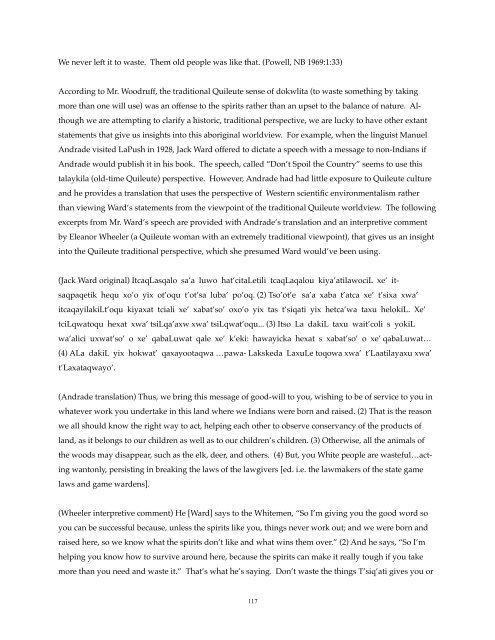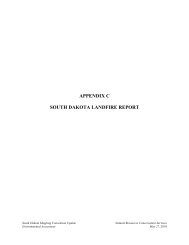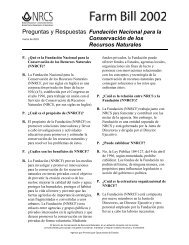The Ozette Prairies of Olympic National Park - Natural Resources ...
The Ozette Prairies of Olympic National Park - Natural Resources ...
The Ozette Prairies of Olympic National Park - Natural Resources ...
You also want an ePaper? Increase the reach of your titles
YUMPU automatically turns print PDFs into web optimized ePapers that Google loves.
We never left it to waste. <strong>The</strong>m old people was like that. (Powell, NB 1969:1:33)<br />
According to Mr. Woodruff, the traditional Quileute sense <strong>of</strong> dokwlita (to waste something by taking<br />
more than one will use) was an <strong>of</strong>fense to the spirits rather than an upset to the balance <strong>of</strong> nature. Although<br />
we are attempting to clarify a historic, traditional perspective, we are lucky to have other extant<br />
statements that give us insights into this aboriginal worldview. For example, when the linguist Manuel<br />
Andrade visited LaPush in 1928, Jack Ward <strong>of</strong>fered to dictate a speech with a message to non-Indians if<br />
Andrade would publish it in his book. <strong>The</strong> speech, called “Don’t Spoil the Country” seems to use this<br />
talaykila (old-time Quileute) perspective. However, Andrade had had little exposure to Quileute culture<br />
and he provides a translation that uses the perspective <strong>of</strong> Western scientific environmentalism rather<br />
than viewing Ward’s statements from the viewpoint <strong>of</strong> the traditional Quileute worldview. <strong>The</strong> following<br />
excerpts from Mr. Ward’s speech are provided with Andrade’s translation and an interpretive comment<br />
by Eleanor Wheeler (a Quileute woman with an extremely traditional viewpoint), that gives us an insight<br />
into the Quileute traditional perspective, which she presumed Ward would’ve been using.<br />
(Jack Ward original) ItcaqLasqalo sa’a luwo hat’citaLetili tcaqLaqalou kiya’atilawociL xe’ itsaqpaqetik<br />
hequ xo’o yix ot’oqu t’ot’sa luba’ po’oq. (2) Tso’ot’e sa’a xaba t’atca xe’ t’sixa xwa’<br />
itcaqayilakiLt’oqu kiyaxat tciali xe’ xabat’so’ oxo’o yix tas t’siqati yix hetca’wa taxu helokiL. Xe’<br />
tciLqwatoqu hexat xwa’ tsiLqa’axw xwa’ tsiLqwat’oqu... (3) Itso La dakiL taxu wait’coli s yokiL<br />
wa’alici uxwat’so’ o xe’ qabaLuwat qale xe’ k’eki: hawayicka hexat s xabat’so’ o xe’ qabaLuwat…<br />
(4) ALa dakiL yix hokwat’ qaxayootaqwa …pawa- Lakskeda LaxuLe toqowa xwa’ t’Laatilayaxu xwa’<br />
t’Laxataqwayo’.<br />
(Andrade translation) Thus, we bring this message <strong>of</strong> good-will to you, wishing to be <strong>of</strong> service to you in<br />
whatever work you undertake in this land where we Indians were born and raised. (2) That is the reason<br />
we all should know the right way to act, helping each other to observe conservancy <strong>of</strong> the products <strong>of</strong><br />
land, as it belongs to our children as well as to our children’s children. (3) Otherwise, all the animals <strong>of</strong><br />
the woods may disappear, such as the elk, deer, and others. (4) But, you White people are wasteful…acting<br />
wantonly, persisting in breaking the laws <strong>of</strong> the lawgivers [ed. i.e. the lawmakers <strong>of</strong> the state game<br />
laws and game wardens].<br />
(Wheeler interpretive comment) He [Ward] says to the Whitemen, “So I’m giving you the good word so<br />
you can be successful because, unless the spirits like you, things never work out; and we were born and<br />
raised here, so we know what the spirits don’t like and what wins them over.” (2) And he says, “So I’m<br />
helping you know how to survive around here, because the spirits can make it really tough if you take<br />
more than you need and waste it.” That’s what he’s saying. Don’t waste the things T’siq’ati gives you or<br />
117
















